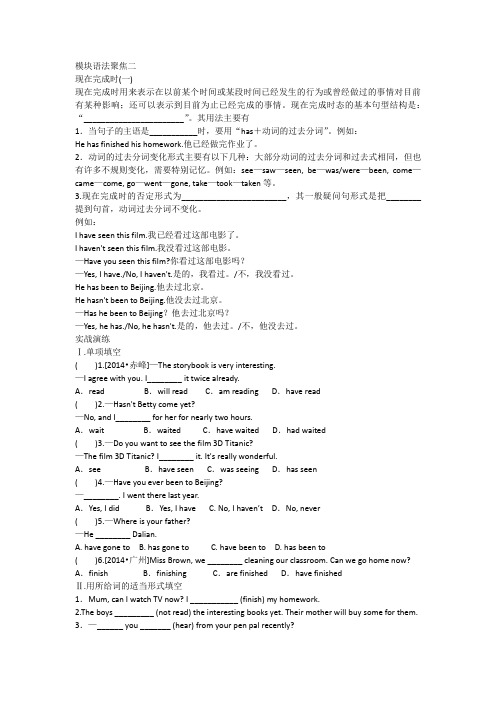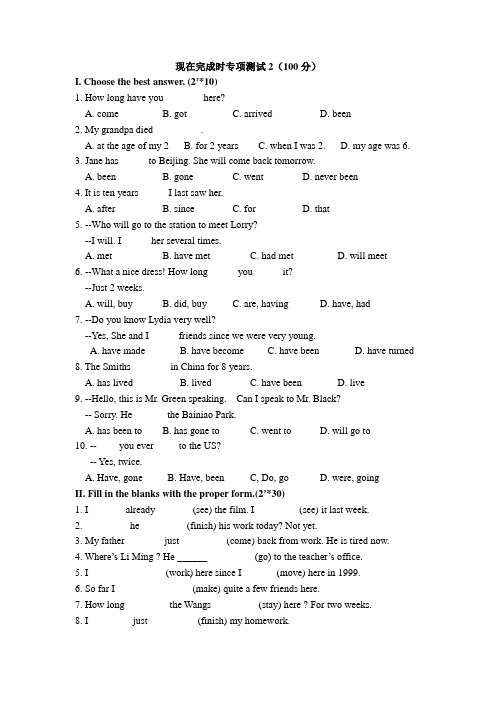现在完成时2
- 格式:ppt
- 大小:1.85 MB
- 文档页数:44

现在完成时现在完成时表示在过去发生但与现在情况有联系的动作或状态的时态。
那么,英语现在完成时的句子结构和语法特点是怎样的呢?下面为您讲解一下。
1、现在完成时的构成:现在完成时是由“助动词have/has+动词过去分词”构成的。
①助动词have/has可以与主语缩写为‟ve / …s。
e.g. I have → I‟ve We have → We‟ve He has → He‟s It has → It‟s②规则变化的过去分词与动词过去式一样。
③不规则变化的动词过去分词见表。
2、现在完成时的基本句型。
①陈述句肯定形式。
e.g. I have had lunch. 我已经吃过午饭了。
He has gone to Beijing. 他去北京了。
②陈述句否定形式。
(在助动词have/has后+not,可缩写为haven‟t/hasn‟te.g. I haven‟t had lunch. 我还未吃午饭。
He hasn‟t gone to Beijing. 他还没有去北京。
③一般疑问句形式及其答语。
(将助动词have/has提前,答语一般用have, has回答)e.g. Have you had lunch? 你吃过午饭了没? Yes, I have. No, I haven‟t.Has he gone to Beijing? 他去过北京了没有? Yes, he has. No, he hasn‟t.否定回答还可以用:No, not yet. / No, never. / No, not even once等。
④特殊疑问句形式。
(疑问词+一般疑问句)e.g. Where has he gone? 他去了哪里?3、现在完成时的三个基本用法。
(1) 现在完成时的第一个基本用法表示过去发生或已完成的某一个动作对现在造成的影响或结果。
e.g. Have you had lunch? Yes, I have. I‟ve just had it.你吃过午饭没?有,吃过了,我刚刚吃的。

★一般现在时:often, usually, always, sometim es, never, seldom, everyweek/day/year/month..., once a week, on Sundays★一般过去时:ago, yesterd ay, the day beforeyesterd ay, last week/year/night/month..., in 1989, just now, at the age of five, one day, ago, long ago, once upon a time, then(那时), on that day,★现在进行时:now, at this time, these days, Listen! Look! at this moment/time★过去进行时:at this time yesterd ay,at that time或"when + 一般过去时从句", at 1:00 last night★现在完成时:recentl y, recentyears, these days/years, lately, since, for + 时段, in the past few years, ever since, in the last five months, up to now, since then, so far, ever, never, yet, lately, once, twice, three/four times..., already, before, just. ★过去完成时:before, by the end of last year/term/month...★一般将来时:tomorro w, next day/week/month/year..., soon, in a few minutes, by..., the day after tomorro w, in the future★过去将来时:the next day/morning/year...,the followi ng month/week...现在完成时:already, yet, so far, as yet, lately,recentl y,thesedays/weeks/years, until now, up to now, since+ 时间点, for+时间段, in the last/past( few years)等过去式:以前的某个时间点如yest erday,one year ago等,in the past一般现在时:always, usually, often, sometim es等现在完成时英语16种时态中不易掌握的一种时态,不仅用法法复杂,而且还通常要与某些特定的词语连用。

模块语法聚焦二现在完成时(一)现在完成时用来表示在以前某个时间或某段时间已经发生的行为或曾经做过的事情对目前有某种影响;还可以表示到目前为止已经完成的事情。
现在完成时态的基本句型结构是:“_______________________”。
其用法主要有1.当句子的主语是___________时,要用“has+动词的过去分词”。
例如:He has finished his homework.他已经做完作业了。
2.动词的过去分词变化形式主要有以下几种:大部分动词的过去分词和过去式相同,但也有许多不规则变化,需要特别记忆。
例如:see—saw—seen, be—was/were—been, come—came—come, go—went—gone, take—took—taken等。
3.现在完成时的否定形式为________________________,其一般疑问句形式是把________ 提到句首,动词过去分词不变化。
例如:I have seen this film.我已经看过这部电影了。
I haven't seen this film.我没看过这部电影。
—Have you seen this film?你看过这部电影吗?—Yes, I have./No, I haven't.是的,我看过。
/不,我没看过。
He has been to Beijing.他去过北京。
He hasn't been to Beijing.他没去过北京。
—Has he been to Beijing?他去过北京吗?—Yes, he has./No, he hasn't.是的,他去过。
/不,他没去过。
实战演练Ⅰ.单项填空()1.[2014•赤峰]—The storybook is very interesting.—I agree with you. I________ it twice already.A.read B.will read C.am reading D.have read()2.—Hasn't Betty come yet?—No, and I________ for her for nearly two hours.A.wait B.waited C.have waited D.had waited()3.—Do you want to see the film 3D Titanic?—The film 3D Titanic? I________ it. It's really wonderful.A.see B.have seen C.was seeing D.has seen()4.—Have you ever been to Beijing?—________. I went there last year.A.Yes, I did B.Yes, I have C. No, I haven’t D.No, never()5.—Where is your father?—He ________ Dalian.A. have gone toB. has gone toC. have been toD. has been to()6.[2014•广州]Miss Brown, we ________ cleaning our classroom. Can we go home now? A.finish B.finishing C.are finished D.have finishedⅡ.用所给词的适当形式填空1.Mum, can I watch TV now? I ___________ (finish) my homework.2.The boys _________ (not read) the interesting books yet. Their mother will buy some for them. 3.—______ you _______ (hear) from your pen pal recently?—Yes, I have. I ______ (get) a letter from him yesterday.4.—_______ you ever ________ (eat) the pizza?—No, I haven't.5.—_____ you _______(call) your mum yet?—Yes, I _____.I _____ _____(call) her last night.6.—______Jack __ ____(visit) his grandparents?—Not yet.7.—______ your parents ever ______(be) abroad?—Yes, just once.8.Who ________ (see) the film before?Ⅲ.按要求完成下列各题1.My parents have gone to England.(对画线部分提问)________________ parents gone?2.—Would you like some more food?—No, thanks. I _________ enough.(完成句子)3.Daming has climbed Mount Tai before.(改为一般疑问句并作否定回答) —________ Daming _________Mount Tai before?—______,he _________.4.He has waited for her for_2_hours.(对画线部分提问)____________________he waited for her?5.Jane came to China two years ago. (改为同义句)Jane ________ ________ in China for two years.模块语法聚焦三现在完成时(二)1.现在完成时态还可以用来表示“刚刚做完某事;已经做完某事”等,此时经常用just, already 和yet来表示,其中,________ 表示“刚刚”;________ 表示“已经”,一般置于________ 之后;just和already都用于肯定句中,在否定句和疑问句中则可用________,表示“还未”。


现在完成时专项测试2(100分)I. Choose the best answer. (2’*10)1. How long have you _______ here?A. comeB. gotC. arrivedD. been2. My grandpa died _________.A. at the age of my 2B. for 2 yearsC. when I was 2.D. my age was 6.3. Jane has _____ to Beijing. She will come back tomorrow.A. beenB. goneC. wentD. never been4. It is ten years _____ I last saw her.A. afterB. sinceC. forD. that5. --Who will go to the station to meet Lorry?--I will. I _____ her several times.A. metB. have metC. had metD. will meet6. --What a nice dress! How long _____ you _____ it?--Just 2 weeks.A. will, buyB. did, buyC. are, havingD. have, had7. --Do you know Lydia very well?--Yes, She and I _____ friends since we were very young.A. have madeB. have becomeC. have beenD. have turned8. The Smiths _______ in China for 8 years.A. has livedB. livedC. have beenD. live9. --Hello, this is Mr. Green speaking. Can I speak to Mr. Black?-- Sorry. He ______ the Bainiao Park.A. has been toB. has gone toC. went toD. will go to10. --____ you ever ____ to the US?-- Yes, twice.A. Have, goneB. Have, been C, Do, go D. were, goingII. Fill in the blanks with the proper form.(2’*30)1. I_______ already_______ (see) the film. I_______ (see) it last week.2. _______ he _______ (finish) his work today? Not yet.3. My father _______ just _______ (come) back from work. He is tired now.4. Where’s Li Ming ? He _____________ (go) to the teacher’s office.5. I _______ _______ (work) here since I ______ (move) here in 1999.6. So far I _______ _______ (make) quite a few friends here.7. How long ________ the Wangs _________(stay) here ? For two weeks.8. I ________ just _________ (finish) my homework.9. He ________ (go) to school on foot every day.10.____ you ______ (find) your science book yet?11. If it _______ (be) fine tomorrow, I'll go with you.12. The students _______ _______ (read) English when the teacher came in.13. Look! The monkey ________ _______ (climb) the tree.14. My mother _______ _______ (will come) to see me next Sunday.15. I've lost my pen. _________ you ________ (see) it anywhere?III. 用since和for填空(2’*10)1. Jim has been in Ireland ______ Monday.2. Jill has been in Ireland ______ three days.3. His aunt has lived in Australia ______15 days.4. Mary is in her office. She has been there ______ 7 o'clock.5. India has been an independent country ______1974.6. The bus is late. They've been waiting ______ 20 minutes.7. Nobody lives in those houses. They have been empty ______ many years.8. Mike has been ill ______a long time. He has been in hospital ______ October.9. They have been here ______ 2000.参考答案I. Choose the best answer. (2’*10)1-5 DCBBB 6 DCCBBII. Fill in the blanks with the proper form.(2’*30)1. have, seen, saw2. Has, finished3. has, come4. has gone5. have worked, moved6. have made7. have, stayed8. have, finished9. goes 10. have, found 11. is 12. were reading 13. is climbing 14. is coming 15. Have, seenIII. 用since和for填空(2’*10)1. since2. for3. for4. since5. since6. for7. for8. since9. since。

现在完成时练习题及答案1. 基础练习a)用现在完成时填空:1.I have traveled to many countries around the world.2.She has already eaten dinner.3.We have studied English for three years.4.He has not finished his homework yet.5.Have you ever seen the Eiffel Tower?b)改写下列句子,使用现在完成时:1.I visited Beijing last year. (肯定句)–I have visited Beijing last year.2.She lost her phone. (否定句)–She has not lost her phone.3.They have read this book. (疑问句)–Have they read this book?A: Have you ever been to Japan?B: No, I haven’t. But I have always wanted to visit Tokyo.A: It’s a beautiful country. Have you seen any pictures of Japan?B: Yes, I have seen many pictures. The landscapes are stunning.A: I have also heard that the food is amazing. Have you tried any Japanese food before?B: Yes, I have tried sus hi. It’s delicious!A: That’s great! You should definitely plan a trip to Japan someday.B: I will. It’s on my bucket list.3. 完成句子1.She has finished her project.2.They have never seen the ocean before.3.Have you ever traveled to Europe?4.We have lived in this city for five years.5.He has already left for the airport.A: Have you watched the new movie yet?B: No, I haven’t had the chance to see it. Is it good?A: Yes, it is really good. I have already watched it twice.B: Wow, that sounds interesting. Have you read the book it’s based on?A: No, I haven’t read the book yet. But I heard it’s even better than the movie.B: I should definitely check it out. Thanks for the recommendation.5. 写作练习请根据以下提示,使用现在完成时写一篇150字以上的短文。
现在完成时(一):开始于过去的动作一直持续到现在,有可能继续持续。
谓语动词为延续性动词 I have lived here for 3 years. 我仍然住在这里,而且还可能继续住下去。
如果在搬家时说这句话,则live这件事只持续到目前为止。
The teacher has taught in this school since I came here.I’ve worked in this company since I left school.since表明了动作开始的时间点。
有上下问明确告知,动作只持续到说话的时刻为止。
a. A: Have you waited long?B: I’ve waited for three hours.b. I’ve waited for him all day; I don’t want to wait any longer.特点:1. 谓语动词为延续性动词2. 动作的发生时间是过去,持续到现在,还可能继续持续下去。
3. 常常与表示一段时间的时间状语连用,是说明某个状态持续了多久。
与现在完成时搭配的时间状语1. since + 时间点a. I’ve worked in thiss company since 1980b. I’ve worked in this company since I left school. (从句中一般过去时)2. for + 时间段a. I’ve worked in this company for three years.b. Great changes have taken place in Beijing for the past few years.3. 到目前为止:until now, up until now, up to now, up till now, so far.a. We have up until now failed to take any action to decide on a common language that would further communication between nations.4. 在最近几世纪/年/月以来:in the past few years, over the past few years, during the last three months, for the last few centuries, through centuries, throughout history.a. Throughout history man has had to accept the fact that all living things must die, for the very nature of life includes death.b. Through centuries the bizarre anticss of sleepwalkers have puzzled police, perplexed scientists anad fascinated writers.现在完成时(二):过去发生但与现在仍有联系的动作或状态a. He has broken his leg. 他现在还在医院,所以不能和同学一起郊游。